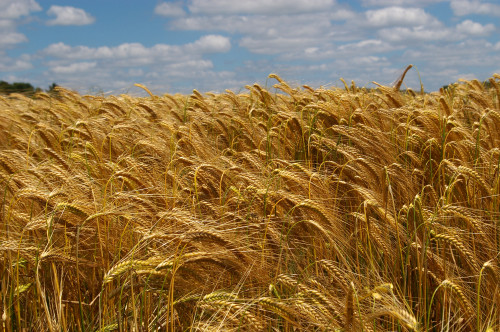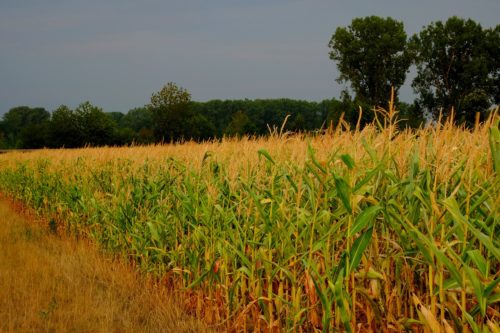TWH — This weekend and next, many modern Pagans, Heathens and polytheists are observing the summer festival of Lughnasadh, also called Lammas, Lughnassa, and Harvest Home. Typically celebrated on Aug. 1, Lughnasadh is one of the yearly fire festivals and marks the first of three harvest celebrations.
It traditionally honors Lugh, the Celtic god of light and many talents, and his foster-mother, Tailtiu.

[Sybarite48, Flickr/CC.]
There are many other late summer religious and secular holidays around the world, some of which are related to the harvest and some are not.
In Tibetan Buddhism, for example, followers will be celebrating Choekhor Duechen, or the first turning wheel of Dharma, July 27. The day marks the time when “the Buddha Shakyamuni first taught the four noble truths in Sarnath, India, and first turned the wheel of the dharma.”
The Order of the Black Madonna, based in California, hosts a number of feast days in August, including an annual dinner in mid-August to honor the Queenship of Mary.
During this time, several Native American nations celebrate the Green Corn festival. This was particularly true of “Cherokee, Creek, Choctaw, Chickasaw, Seminole, Timucua, and others, who used corn (maize) as their single most important food source.” The ceremony and festival, also called puskita or Busk in English, was “an expression of gratitude for a successful corn crop.”
Outside the U.S., the Slavic communities celebrate Dozhinki, a pre-Christian harvest festival that happens in late August. This year, the holiday is dated Aug. 28.
In the Southern Hemisphere, Pagans, Heathens and polytheists are readying for Imbolc, and other holidays focused on late winter and the coming potential of spring.
This year, the full moon arrives Aug. 7, and a total solar eclipse is coming to America Aug. 21. According to reports, the entire country, from Oregon to South Carolina, will be able to witness at least a partial eclipse.
Here are a few recent quotes about the seasonal celebration:
“Lammas is basically about work, coming and going. Mind you, there are three harvest sabbats, and the trick with this first harvest that it falls midpoint of the fiery sign of Leo, which lends its ‘fixed’ energies of sustaining the cycle, to bring our work to full fruition; no slacking behind now! Magick demands much of us at this time. Toil and sacrifice are required if we are to claim the big prize come Mabontides.” — Heron Michelle, Lammas Ritual of Integration and Sacrifice
* * *
“This August 1st, I suggest we forget everything we have heard about Lughnasadh or Lammas. Instead of treading that well-worn path, let’s forget about Celtic myths from long ago and the agricultural customs of 18th century English peasants. Forget even the words ‘Lughnasadh’ or ‘Lammas.’ Instead, go outside. Look. Listen. Breathe in and breathe out. Bend down and touch the earth. And then ask what the world is telling you. Listen for what calls to you. Discover what needs to be celebrated, or what needs to be mourned. And if the season still speaks to you of harvest or sacrifice or making bread, then so be it. But if not, don’t force it.” — John Halstead, “Why I’m Boycotting Lughnasadh Again”
* * *
“What will I do during those 100 or so sacred seconds [of the solar eclipse]? Will I hold a ritual? Just revel in it? Hug my kids?[…] Would the descent into darkness (and then the return of the light) be better times for ritual activity? After all, those times are ~90 minutes long each, and that would make the whole time of totality part of my ritual if I started before totality and ended after it. […] All religions have sacred times and sacred places. For those of us with a Pagan spirituality (as well as for many others), reality itself – and especially our Earth, moon and sun – often show us those sacred times. For many of us (and certainly me), this August 21st will be one of those most sacred times. What will those 90 seconds be like for you? I don’t think that can be predicted – we can’t decide when the sacred will touch us.” – Jon Cleland Host, “The Spirituality of the Eclipse”
* * *
“Lugh was the first god I got to know as an individual being. Before that, most of my practice revolved around the Wiccan idea of the Goddess and the God, or other concepts that some would describe as panentheist and others would describe as vague. This was before my encounter with the Ennead of Egypt that put me firmly on the road to polytheism, and I honestly don’t remember what I thought about Lugh. But I clearly remember how I related to Lugh – as an individual deity with his own sovereignty and agency. Did Lugh call me or did I pursue Lugh? My notes from the time are sparse and I can’t begin to remember. I just remember I felt a strong affinity with him. I am no master of all arts, but I’ve always had a wide range of interests, and Lugh seemed like he would be the perfect patron for me.” — John Beckett, “The Birth of Lugh”
* * *
“Lughnasadh is a very good time to express gratitude to the gods and the earth spirits for their blessings and gifts that we are now receiving. In times of microwave and frozen pizza it may seem anachronistic to thank for the harvest. Many of our modern foodstuffs make it hard to still recognize the waving grain on the field in them. And yet there is a way to connect with nature via the food that we eat. This is especially valid for self-harvested fruits. But also conscious eating, eating with focus on the food and not on TV or newspaper, is one way of expressing our thanks for the harvest – all year round, but especially at Lughnasadh.” — Eilthireach, Deeper Into Lughnasadh

[Pixabay.]
The Wild Hunt is not responsible for links to external content.
To join a conversation on this post:
Visit our The Wild Hunt subreddit! Point your favorite browser to https://www.reddit.com/r/The_Wild_Hunt_News/, then click “JOIN”. Make sure to click the bell, too, to be notified of new articles posted to our subreddit.